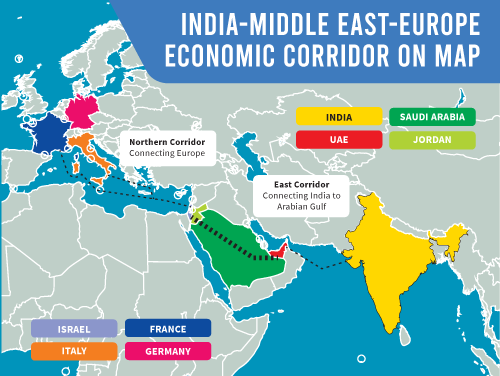Virendra Pandit
New Delhi: Barely a month after its announcement, the fate of the proposed India-Middle East-Europe Economic Corridor (IMEEC) has come under a cloud.
During the G-20 Summit in New Delhi, India, the US, the UAE, Saudi Arabia, France, Germany, and the European Union signed the Memorandum of Understanding (MoU) on September 10 to roll out the IMEEC, viewed as a reply to China’s Belt and Road Initiative (BRI).
But the ongoing Hamas-Israeli conflict, which broke out on October 7, has sown doubts about the mammoth project.
Finance Minister Nirmala Sitharaman said on Friday that the strife did not figure significantly in discussions held with the G-20 Finance Ministers in Marrakech, Morocco.
But the fresh crisis has brought concerns about fuel, food security, and supply chains to the forefront again, she said in a briefing after the last meeting under India’s presidency of the G-20 Finance Ministers and Central Bank Governors (FMCBG), in Marrakech, on October 12 and 13.
Now, the Global Trade Research Initiative (GTRI), a think tank, has said the conflict could derail the prospect of a historic peace deal between Israel and Saudi Arabia, a crucial link in the IMEEC framework, and may lead to delays and complications in its execution, the media reported on Saturday.
It said while the conflict’s immediate consequences are confined to Israel and the Gaza Strip, its ripple effects throughout the Middle East cannot be underestimated.
Although Saudi Arabia and Israel have historically maintained no formal diplomatic ties, recent years have witnessed signs of a thaw, with negotiations underway for normalization of bilateral relations, GTRI Co-Founder Ajay Srivastava said, adding that the war may derail any progress made.
“The ongoing Israel-Hamas conflict may disrupt the project’s timelines and outcomes, marking a pivotal juncture in developing this ambitious economic corridor. While the war’s direct impact remains regional, the geopolitical consequences reverberate far beyond, with potential consequences for the proposed corridor,” he added.
The IMEEC aims to boost economic development by fostering connectivity and economic integration between Asia, the Persian Gulf, and Europe.
The envisioned corridor would span from India to Europe, passing through the UAE, Saudi Arabia, Jordan, Israel, and Greece.
The project’s key goal is to enhance transportation and communication links between Europe and Asia.

